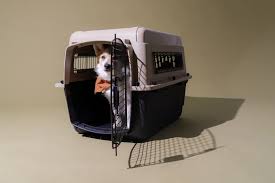
Best Kennels for Large and Small Dog Breeds
This article guides pet owners in choosing appropriate kennels for their dogs, considering size, breed, temperament, and travel needs. It discusses various kennel types, materials, and features, emphasizing the importance of safety, comfort, and proper ventilation for both large and small breeds.
🐶 Pet Star
15 min read · 1, Feb 2025

Understanding Your Dog's Needs: Size, Breed, and Temperament
Now, before we dive into the specifics, it's crucial to understand your dog's individual needs. A tiny Chihuahua will have very different requirements than a Great Dane! Size is the most obvious factor, but breed and temperament also play a significant role. Some dogs are naturally anxious travelers, while others are more laid-back. A high-energy dog will need a kennel that provides ample space to move around, while a more sedentary dog might be comfortable in a smaller space.
Kennel Materials: Durability and Safety
Kennels come in a variety of materials, each with its own pros and cons. Plastic kennels are lightweight and easy to clean, making them a popular choice for travel. Wire kennels offer excellent ventilation and visibility, but they can be less durable and might not be suitable for dogs who are prone to escaping. Wooden kennels can be aesthetically pleasing, but they require more maintenance and might not be as hygienic as other options. For large breeds, durability is paramount. You need a kennel that can withstand their strength and prevent them from breaking out.
Choosing the Right Size: Comfort and Space
The size of the kennel is crucial for your dog's comfort. It should be large enough for your dog to stand up, turn around, and lie down comfortably. A kennel that's too small can be cramped and stressful, while one that's too large might not provide adequate security. For small breeds, a cozy and secure space is important. They might feel overwhelmed in a large, open kennel. For large breeds, ensure the kennel has reinforced construction and a secure locking mechanism.
Ventilation and Airflow: Keeping it Fresh
Proper ventilation is essential for your dog's health and well-being. A kennel with good airflow will prevent the buildup of heat and humidity, which can be dangerous, especially in warm weather. Wire kennels generally offer the best ventilation, but plastic kennels with strategically placed vents can also be adequate.
Portability and Travel: Kennels on the Go
If you plan on traveling with your dog, you'll need a portable kennel that meets airline or vehicle regulations. Plastic kennels are often the preferred choice for air travel, as they're lightweight and durable. For car travel, a wire or plastic kennel that can be securely fastened in the vehicle is recommended.
Kennel Features: Extras for Comfort and Convenience
Many kennels come with additional features that can enhance your dog's comfort and your convenience. Some kennels have built-in food and water bowls, while others have removable trays for easy cleaning. Wheels can be helpful for moving large kennels, and lockable doors provide added security.
Specific Considerations for Large Breeds
Large breeds require kennels that are specifically designed to accommodate their size and strength. Look for kennels made from heavy-duty materials with reinforced construction. The kennel should have a strong and secure locking mechanism to prevent escapes. Wheels or handles can make it easier to move a large kennel.
Specific Considerations for Small Breeds
Small breeds often feel more secure in cozy and enclosed spaces. A smaller kennel can provide them with a sense of comfort and safety. Look for kennels with soft bedding and good ventilation. Avoid kennels with large gaps or openings that your small dog could squeeze through.
Kennel Training: Making it a Positive Experience
Introducing your dog to their kennel in a positive way is essential. Start by placing treats and toys inside the kennel to create a positive association. Encourage your dog to enter the kennel voluntarily, and gradually increase the amount of time they spend inside. Never use the kennel as a punishment, as this will create a negative association.
Choosing the Right Kennel for Your Lifestyle
Ultimately, the best kennel for your dog will depend on their individual needs, your lifestyle, and your budget. Consider all the factors discussed above before making a decision. Do your research, read reviews, and talk to other pet owners to get their recommendations.
Q&A Section:
Q1: My dog is a chewer. What type of kennel is best for him?
Ans: For chewers, a metal or heavy-duty plastic kennel is the best option. Avoid kennels made from lightweight plastic or fabric, as these can be easily chewed through.
Q2: How do I measure my dog for a kennel?
Ans: Measure your dog from the tip of their nose to the base of their tail, and from the top of their head to the ground. Add a few inches to these measurements to ensure they have enough room to stand up, turn around, and lie down comfortably.
Q3: My dog gets anxious when traveling. What can I do to make him more comfortable in his kennel?
Ans: Make the kennel a positive space by placing familiar blankets, toys, and treats inside. You can also try using calming sprays or pheromones to help reduce anxiety. Gradually introduce your dog to the kennel and associate it with positive experiences.
Q4: Can I leave my dog in a kennel for long periods?
Ans: While kennels can be useful for short periods, it's not recommended to leave your dog in a kennel for extended periods. Dogs need exercise, social interaction, and mental stimulation. Prolonged confinement can lead to boredom, anxiety, and behavioral problems.
Q5: Where should I place my dog's kennel?
Ans: Place the kennel in a quiet and comfortable area of your home, away from drafts and direct sunlight. Make sure it's a place where your dog feels safe and secure.
Similar Articles
Find more relatable content in similar Articles
Explore Other Categories
© 2024 Copyrights by rPets. All Rights Reserved.